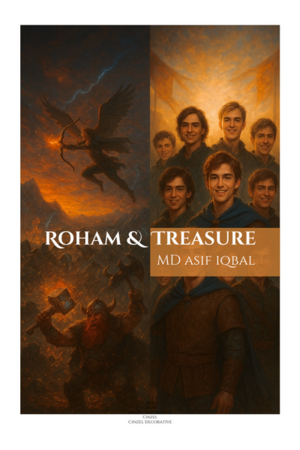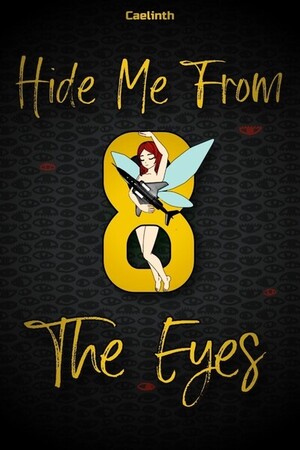Chapter 6:
Part 6
Roham And Treasure
In the heart of Sirotin, where the moon’s silver beams fell upon ancient stone, there stood a marvelous structure—its head held high in majesty. Three stories tall, this grand house glowed with golden light pouring from every window. From every room came the rhythm of life, voices and laughter weaving together like music.
Even at this late hour, the house was alive with sound—like a being that never slept, its heart forever beating. Inside were countless rooms, each one holding a story, each one a vessel for a dream. Before it stretched a garden, where moonlit flowers blossomed, where branches swayed in the night breeze, and the scent of roses mingled with the cool air.
This was Sirotin’s rest house. A haven for weary travelers, a guesthouse where exhausted souls sought peace. Merchants and wanderers came from distant lands, bringing with them countless stories, memories, and the heavy weight of unspoken dreams.
Then, in the depth of night, when the world was drowning in silence, the peace was shattered. The sharp, thunderous pounding of hooves broke through the stillness—like a harbinger of disaster.
Salih stumbled into the garden. His face was pale, his eyes etched with unspeakable fear. His body trembled, sweat beading on his brow like pearls. His hair fell in wild strands across his face, and his breath came in ragged gasps.
Through the silver-lit garden, another figure raced in—swift as the wind. This was Karam—his name as sweet as his face was handsome. Tall and youthful, his very presence glowed with vitality.
Panting from his run, concern sharpened his voice as he asked,
“Brother Salih, why are you so late? You’re drenched in sweat. What happened?”
Karam was a member of Roham. Here in Sirotin, he held Roham’s authority.
Salih, still quivering from the memory, slid off his horse. His legs shook so badly he could hardly stand. His strength seemed drained away. On the soft grass, he collapsed—like a wounded bird that had finally found a safe place to rest. Moonlight carved deep lines of terror and exhaustion across his face. His chest rose and fell unevenly, each breath a struggle.
His voice, which had quivered with panic moments ago, now trembled with relief and horror as he whispered,
“Karam… I ran into a bandit on the road.”
At once, Karam sprang into action. His feet carried him swiftly to the kitchen. Within moments, he returned—bearing a plate of warm food and a jug of cool, sweet water. Moonlight made his features shine brighter. Sitting beside Salih, he offered him sustenance and company.
And there, on the soft grass beneath the moon’s gentle glow, in a garden filled with roses and night’s fragrant breeze—Salih began to recount his terrible ordeal.
His voice carried both thrill and terror. His eyes burned with the memory of fire. He described everything—every moment, every shiver of fear, every beat of panic.
And Karam listened, wide-eyed, enchanted by every twist in the tale.
Moonlight wrapped them in its silver spell as the night breeze carried away the sound of their voices.
Half an hour passed. Salih had painted a saga of courage, a tale of how his wit alone had saved him from a dreadful robber.
Karam’s eyes shone with wonder, admiration filling his face. How magnificent this story seemed!
But then—someone called Karam’s name from behind.
That voice! Familiar, sharp—cutting through the quiet of night.
Both Salih and Karam turned, as if pulled by a magician’s charm.
And then… the sight! The moment!
Their faces froze. The world seemed to stop spinning. Even the moon, it seemed, stood stunned, gazing upon the impossible.
Salih’s eyes grew wide as two full moons. All color drained from his handsome face, as though an artist had wiped his brush clean. His heart stumbled, then hammered violently.
For there, standing before him, was the very youth—the same tall, striking figure he had thought a terrifying bandit! The moonlight only made him more radiant, his long hair drifting in the breeze, his own eyes wide with the same shock and fear.
Salih, who had been boasting of bravery only moments before, now leapt to his feet like a startled frog. His body jerked upright, fear etched once more across his face.
And then—!
Both of them—Salih and the young man, these two so-called heroes, these two “fierce warriors”—pointed their trembling fingers at each other. Their hands shook, their voices quavered with terror as they shouted, in unison,
“Karam—bandit!”
At the exact same time, in the exact same tone!
Karam, who had listened in awe all this while, now stood dumbfounded. His expression was as if he were watching two ghosts dance before his eyes. Questions spun wildly in his mind. His brows furrowed deep in thought.
He glanced at Salih, then at the youth, then back again.
But poor Karam could make no sense of it. His eyes darted back and forth. His face wore the look of a man thinking, Have they both gone mad?
A moment later, the truth dawned. The ridiculousness of it all burst open in his mind: two harmless lambs, each mistaking the other for a lion!
And Karam’s laughter erupted like a flood.
What a laugh it was! Joy spread across his handsome face, his eyes sparkling with delight. He laughed and laughed, until his stomach ached.
In the moonlit garden, the flowers themselves must have paused to watch. Karam laughed until both men understood their folly.
And laughter rose like silver waves upon the night’s dark ocean.
Salih and the youth lowered their heads in shame. Fear melted from their eyes, leaving only the memory of shared laughter.
Above them, the stars seemed to burn brighter—as if they too wished to witness this foolish, beautiful mistake.
Rose-scent drifted through the still air, as though nature itself joined in the laughter.
All the choking darkness dissolved into light.
And in that light, the three young men found joy together.
It was a timeless lesson:
No matter how deep the dark,
no matter how frightening the shadows of misunderstanding—
in the end, all of it breaks before the tide of laughter.
The moon lifted its face, smiling faintly,
as if to declare from the heavens:
No matter how dreadful the night,
its end always brings light, and laughter,
and the poetry of life.




Please sign in to leave a comment.